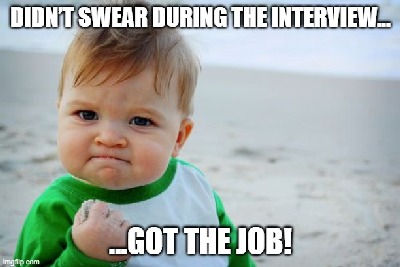When it comes to job interviews, everyone wants to make a great first impression, but sometimes small mistakes can cost you the opportunity. Hiring managers have seen a variety of behaviors during interviews—some of them odd and even unacceptable. For instance, Stephanie Fackrell, a former recruiter at Nvidia, once heard a candidate say he wasn’t that interested in the job. Another recruiter from Amazon, Lindsay Mustain, received a resume where the third page featured a picture of the candidate holding a gun. While these examples are extreme, there are far more common mistakes that hiring managers encounter on a regular basis.
1. Arriving Late (53%)
Being late to an interview shows a lack of respect for the interviewer’s time. It gives the impression that the candidate isn’t organized or serious about the position.
2. Using Inappropriate Language (52%)
Swearing or using unprofessional language during an interview can be a major red flag. It’s important to remember that the interview is a professional setting, and hiring managers expect candidates to maintain a certain level of decorum.
3. Showing Disinterest or Detachment (51%)
Acting disinterested or indifferent during an interview can make it seem like the candidate doesn’t really want the job. Enthusiasm and engagement are key to showing the employer that you’re excited about the opportunity.
4. Using Your Phone (50%)
Checking your phone during an interview is not only distracting, but it also signals that you are not fully present in the conversation.
5. Wearing Inappropriate Attire (46%)
Dressing inappropriately for the interview can send the wrong message. It’s crucial to dress professionally and match the company’s culture.
6. Being Unprepared for Basic Questions (38%)
Not being ready to answer simple questions about your background or the role can give the impression that you haven’t put any effort into preparing.
7. Speaking Poorly About Previous Employers (32%)
Badmouthing a former employer raises concerns about professionalism and discretion. It’s better to stay positive, even if your last experience wasn’t great.
8. Failing to Ask Questions (25%)
Not asking any questions about the job or company can make you appear uninterested. Preparing thoughtful questions shows that you’re genuinely considering the opportunity.
9. Not Researching the Company (21%)
Failing to research the company beforehand can make you seem unprepared. Doing a bit of homework shows that you care about the position and understand the company’s values and goals.
10. Not Sending a Thank You Note (16%)
Sending a follow-up thank you email after the interview is a simple gesture that can leave a lasting impression. It shows your appreciation for the interviewer’s time and reinforces your interest in the position.
Adjusting to Post-Pandemic Professionalism
Career expert Drew McCaskill from LinkedIn mentions that, during the pandemic, hiring managers were more forgiving of certain behaviors. We had meetings with children on laps and people wearing yoga pants during video calls. However, as the pandemic becomes a thing of the past, hiring managers are returning to a higher level of expectation for professionalism during interviews.
Employers are now seeking candidates who show that they can perform at their best, both in interviews and on the job.
Coping with the Stress of a Job Search
Searching for a job, especially after being laid off, can be emotionally draining. A study of 4,864 patients showed that unemployed individuals scored 28% higher on the depression scale than those who were employed. If you’re on the job hunt and struggling emotionally, there are methods to help reduce anxiety and maintain a positive outlook.
Whether you’re a first-time job seeker or navigating the job market after a break, avoiding these mistakes can make a big difference in securing that dream job. Stay professional, be prepared, and don’t forget the small details—they matter more than you think.
Read the article “5 strategies for Navigating Business Conflicts”


Leave a Reply
You must be logged in to post a comment.